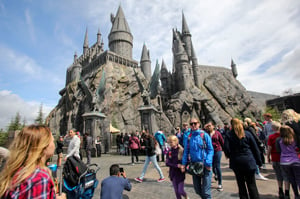NBCUniversal has made a half-billion-dollar bet that a boy wizard will help its theme park division take a little bit of the magic away from industry leader Walt Disney Co.
Its Universal Studios Hollywood theme park is set to officially open its latest attraction, the Wizarding World of Harry Potter, this week after two months of “soft” operations. The $500 million it spent on the Hollywood version of Hogwarts, along with an attraction based on TV zombie hit “The Walking Dead” set to open this summer and other branded offerings, is part of the media giant’s $1.6 billion redevelopment plan for its 391-acre property in Universal City.
The investment comes as rival Disney is doubling down on its theme park efforts, adding both “Star Wars”- and “Avatar”-themed attractions.
“Universal and Disney are in the biggest armaments war they’ve ever been in,” said Dennis Speigel, president of Cincinnati consulting firm International Theme Park Services Inc. “They’re in the boxing ring for products, attendance, and revenue.”
The U.S. theme park industry generated about $15 billion in revenue in 2014, the most recent data available, and NBCUniversal claims a stake of about 20 percent of that market. Disney, by contrast, has roughly 53 percent, according to latest industry report figures.
NBCUniversal, a unit of Philadelphia-based Comcast Corp., has boosted its capital expenditures on its park division in recent years. In its latest annual report, Comcast said NBCUniversal spent $1.4 billion on capital expenditures last year – a 13.5 percent increase over 2014 – “primarily due to continued investment in our Universal theme parks, including a purchase of land in 2015.”
Analysts said Comcast’s renewed focus on NBCUniversal’s theme parks is driven by solid profit margins and is a way to capitalize on existing media properties, such as the Potter franchise.
The parent company’s revenue from the segment grew by more than 27 percent last year and while the division remains a relatively small part of Comcast’s overall business, the company’s September purchase of a controlling stake in Universal Studios Japan underlines the new focus. The parent company had operating income of $16 billion in 2015, of which theme parks generated $1.5 billion, an increase of 34 percent from the prior year.
“They’re consistently putting money into theme parks and seeing good returns on those capital investments,” said Dave Heger, a senior equity analyst at Edward D. Jones & Co. in St. Louis. “They seem pretty serious about that growth even though it’s relatively small compared to the cable business segment.”
NBCUniversal has seen year-over-year growth in its theme park segment of roughly 12 percent over the past five years, according to Santa Monica market research group IbisWorld; revenue is projected to hit $2.8 billion this year.
Growth within the theme park sector as a whole, which analysts said should benefit from declining unemployment and greater consumer spending, has helped propel revenue and increase profits.
Speigel is projecting theme park revenue growth at NBCUniversal of 20 percent to 25 percent over the next few years.
Lessons learned
If the past is any guide, the Hollywood attraction could prove a big draw.
After NBCUniversal opened its first Harry Potter attraction at its Universal Orlando Resort in Florida in 2010, attendance numbers rose by 28 percent to 8.3 million guests by 2014, according to statistics firm Statista.
“The Harry Potter attraction has had the most significant impact on the Universal theme parks of anything they’ve done in the past 40 years,” Speigel said, adding that the franchise is showing no signs of diminished popularity.
The eight Harry Potter films, released by Warner Bros. between 2001 and 2011, grossed a total of $7.7 billion in global box office. Warners exited the theme park business several years ago and now licenses its film characters to theme parks, such as with Harry Potter to Universal.
A new movie set in the Potter universe, “Fantastic Beasts and Where to Find Them,” could generate a fresh wave of Pottermania when it opens in November.
The Universal Studios Hollywood park features upgraded versions of the Potter attractions at the Orlando sister park, such as the Harry Potter and the Forbidden Journey ride now converted to 3-D. Roller coaster Flight of the Hippogriff twists its way over Hogsmeade Village, where visitors can buy merchandise ranging from magic wands to candy, as featured in the film franchise.
Popular characters
Meanwhile, film division Universal Studios Inc. saw a record year at the box office last year with huge hits such as “Jurassic World” and “Fast and Furious 7” helping power it to a $6.9 billion global box-office take, ahead of the $5.9 billion posted by Disney, its closest rival.
NBCUniversal has a deep stable of intellectual property rights in the film industry to draw upon for its parks. But Disney still has a leg up in that area thanks to all the characters generated by its Marvel Entertainment, Pixar Animation Studios, and Lucasfilm Ltd. properties, including a host of superheroes and the universe of “Star Wars” characters.
“Disney gets a much higher valuation multiple just because of the depth of the library as well as the consistency of performance,” said Tuna Amobi, a senior media and entertainment analyst at Standard & Poor’s U.S. Equity Research Services.
“It is a battle of having effective mass entertainment attractions,” said John Wood, chief executive of Sally Corp., a Jackson, Fla., theme park ride and animatronics manufacturing company. “If you didn’t have the entertainment value to go along and support the intellectual property, it wouldn’t be successful.”
Staff reporter Henry Meier contributed to this report.

